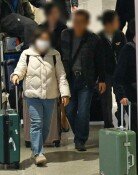[Diplomatic News] Dong-A Ilbo Ad Incident in 1974 Motivated Japanese Correspondent to Learn Korean
[Diplomatic News] Dong-A Ilbo Ad Incident in 1974 Motivated Japanese Correspondent to Learn Korean
Posted July. 22, 2005 06:11,
I always appreciate King Sejong.
Toshikatsu Huzimoto, 56, a chief director at the NHK World production center, describes himself as half Korean. He is a Korea expert who has been reporting Japans news in Korean for the past 30 years. Through a program dubbed Radio Japan Korean Services, he produces and sends out six 30 min-long programs every day, including news and commentary, Japanese language programs, and viewer letter sections. If possible, he hopes to communicate Korean current issues to the Japanese people as a member of the Korea Broadcasting Services (KBS) international broadcasting division.
I feel angry when clerks ignore guests and are busy taking personal calls when I visit stores downtown Seoul with Japanese guests. What would they make of Korea or Koreans? It is times like that when I wish I didnt speak Korean.
After joining NHK as an anchorman in 1973, he was first assigned to Shimonoseki City. As a Chinese language major in college, he started to develop an interest in Korean characters, called hangeul, after observing them at the Bugwan Ferry, a regular line linking Korea and Japan. When he invited a Korean language teacher to visit him and was studying with his colleagues, the Dong-A Ilbo ad oppression incident in 1974 further fueled his passion to learn Korean.
Hearing the news that advertisements were banned by Park Chung-hees authoritarian regime, some Japanese initiated a movement to subscribe to Dong-A Ilbo. I also started reading the newspaper regularly and set a goal of reading the articles in Korean.
His work in Korean broadcasting began in 1975 after moving to Tokyo.
Back then, Korea had negative connotations like dictatorship, so people were not very interested in hangeul. I was awakened to a new world thanks to the Korean language, and even met celebrities for interviews.
Cho Yong-pil, Lee mi-ja, Choi Eun-hee, Ahn Seong-gi, Lee Seong-ae, Kim Serena, Kim Yeon-ja, Na Hoon-ah, and Jeong Kyung-hwa are the Korean celebrities interviewed by him. He even translated and published Lee Mun-yeols bestseller, Our Twisted Hero. He also said that he had to look up words in a Korean dictionary several times to understand his favorite song, Songhaksa.
Even a person like me who doesnt like soap operas is into Korean drama series these days, such as Dae Jang Geum and All In. Its a sea change to witness the recent fervor over Korean pop culture known as the Korean wave. I think resolving past history issues cannot come overnight, so mutual efforts to understand each other will be important.
(This article was written on the recommendation of reader Kim Chi-hyun from Busan.)
Hun-Joo Cho hanscho@donga.com







